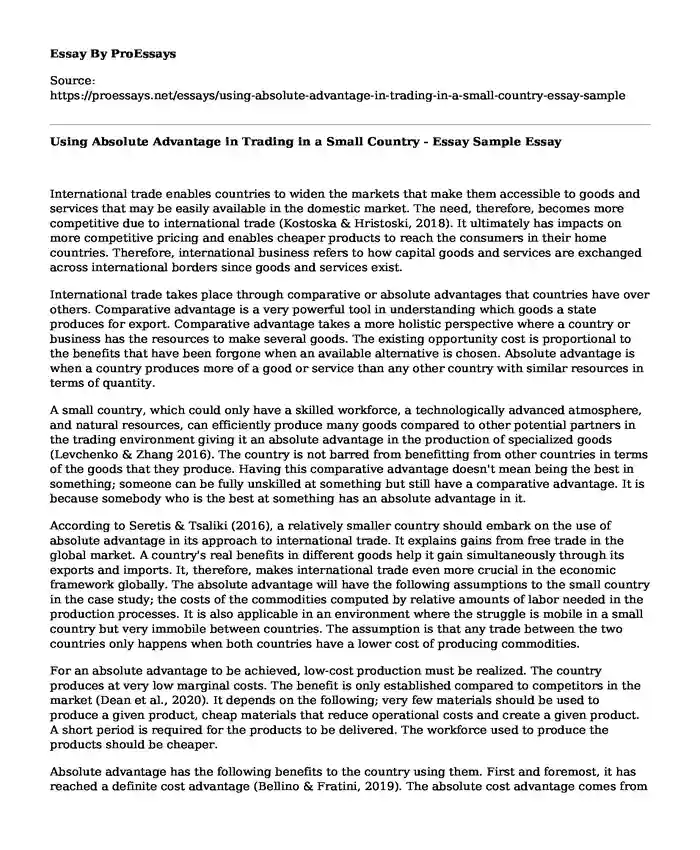International trade enables countries to widen the markets that make them accessible to goods and services that may be easily available in the domestic market. The need, therefore, becomes more competitive due to international trade (Kostoska & Hristoski, 2018). It ultimately has impacts on more competitive pricing and enables cheaper products to reach the consumers in their home countries. Therefore, international business refers to how capital goods and services are exchanged across international borders since goods and services exist.
International trade takes place through comparative or absolute advantages that countries have over others. Comparative advantage is a very powerful tool in understanding which goods a state produces for export. Comparative advantage takes a more holistic perspective where a country or business has the resources to make several goods. The existing opportunity cost is proportional to the benefits that have been forgone when an available alternative is chosen. Absolute advantage is when a country produces more of a good or service than any other country with similar resources in terms of quantity.
A small country, which could only have a skilled workforce, a technologically advanced atmosphere, and natural resources, can efficiently produce many goods compared to other potential partners in the trading environment giving it an absolute advantage in the production of specialized goods (Levchenko & Zhang 2016). The country is not barred from benefitting from other countries in terms of the goods that they produce. Having this comparative advantage doesn't mean being the best in something; someone can be fully unskilled at something but still have a comparative advantage. It is because somebody who is the best at something has an absolute advantage in it.
According to Seretis & Tsaliki (2016), a relatively smaller country should embark on the use of absolute advantage in its approach to international trade. It explains gains from free trade in the global market. A country's real benefits in different goods help it gain simultaneously through its exports and imports. It, therefore, makes international trade even more crucial in the economic framework globally. The absolute advantage will have the following assumptions to the small country in the case study; the costs of the commodities computed by relative amounts of labor needed in the production processes. It is also applicable in an environment where the struggle is mobile in a small country but very immobile between countries. The assumption is that any trade between the two countries only happens when both countries have a lower cost of producing commodities.
For an absolute advantage to be achieved, low-cost production must be realized. The country produces at very low marginal costs. The benefit is only established compared to competitors in the market (Dean et al., 2020). It depends on the following; very few materials should be used to produce a given product, cheap materials that reduce operational costs and create a given product. A short period is required for the products to be delivered. The workforce used to produce the products should be cheaper.
Absolute advantage has the following benefits to the country using them. First and foremost, it has reached a definite cost advantage (Bellino & Fratini, 2019). The absolute cost advantage comes from labor specialization and results in higher productivity and a very low production cost. The economies of scale also explain how the production costs are lowered since a higher output resulting from labor diversification reduces production costs very significantly. The country should only produce such goods that are favoring the prevailing climatic environment. The types of such produced goods depend on the availability of natural resources. The availability of natural resources provides an advantage to the country while producing its goods.
References
Bellino, E., & Fratini, S. M. (2019). Absolute Advantages and Capital Mobility in International Trade Theory. Centro Sraffa Working Papers, 39. http://www.centrosraffa.org/public/0de65989-34b8-4305-b6c8-0e322a99ec23.pdf
Dean, E., Elardo, J., Green, M., Wilson, B., & Berger, S. (2020). Absolute and comparative advantage. Principles of Economics: Scarcity and Social Provisioning (2nd Ed.). https://openoregon.pressbooks.pub/socialprovisioning2/chapter/26-1-absolute-and-comparative-advantage/
Kostoska, O., & Hristoski, I. (2018). Trade dynamics revealed comparative advantage, and international competitiveness: Evidence from Macedonia. Economic Annals, 63(218), 23-58. http://www.doiserbia.nb.rs/Article.aspx?id=0013-32641818023
KLevchenko, A. A., & Zhang, J. (2016). The evolution of comparative advantage- measurement and welfare implications. Journal of Monetary Economics, 78, 96-111. https://www.sciencedirect.com/science/article/pii/S0304393216000088
Seretis, S.E., & Maliki, p. v., (2016). Absolute advantage and international trade; evidence from four euro-zone economies.48(3), 438-451. https://journals.sagepub.com/doi/abs/10.1177/0486613415603160
Cite this page
Using Absolute Advantage in Trading in a Small Country - Essay Sample. (2023, Dec 15). Retrieved from https://proessays.net/essays/using-absolute-advantage-in-trading-in-a-small-country-essay-sample
If you are the original author of this essay and no longer wish to have it published on the ProEssays website, please click below to request its removal:
- Report on the Background to International Hotel Industry
- Why It Is Worth to Open a Restaurant Essay
- IKEA: Making Life Better for the World's Many People Essay
- Questions and Answers on Human Resources Management
- The Hotel Simulation Tool Paper Example
- Essay Sample on South China Sea Dispute: Multilateral Conflict Over Resources
- US-China Trade Wars: Impact on Pet Food Industry - Essay Sample







